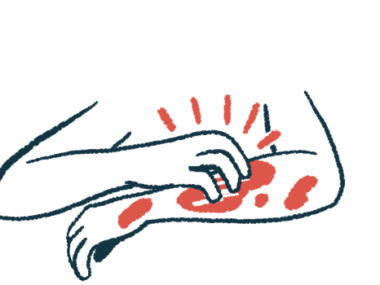Vyjuvek wins approval in Europe for DEB patients from birth
Therapy delivers healthy copies of COL7A1 to skin cells, to make collagen
Written by |

The European Commission has approved the topical gene therapy Vyjuvek (beremagene geperpavec) to treat wounds, starting at birth in people with dystrophic epidermolysis bullosa (DEB) who have disease-causing mutations in the COL7A1 gene.
The decision, which applies to all European Union countries, and includes Iceland, Norway, and Liechtenstein, makes Vyjuvek the first corrective medicine that’s designed to address the disease’s root genetic cause to be approved in Europe for DEB. It aligns with a recent recommendation from a European Medicines Agency committee.
Already approved in the U.S. for DEB patients 6 months and older, Vyjuvek is also under review in Japan. A decision is expected this year.
“We are delighted that Vyjuvek has been approved in Europe as a safe and effective therapy for the many patients across Europe suffering from DEB,” Suma Krishnan, president of research and development at Krystal Biotech, Vyjuvek’s developer, said in a company press release. “This approval marks a critical milestone in our commitment to improving the lives of DEB patients around the world and we look forward to providing patients in Europe with the first corrective medicine for this debilitating disease.”
How is Vyjuvek administered and how does it work in DEB?
The therapy is administered directly onto wounds once weekly. As in the U.S., the European approval lets Vyjuvek be administered at home or in a healthcare setting. But unlike in the U.S., which requires that it be administered by a healthcare professional, there will be an option for patients or caregivers to administer it if a provider deems it appropriate.
Krystal is planning its first European launch in Germany around mid-year. The timing for its availability in other countries will depend on various factors, including the completion of reimbursement agreements.
“After years of preparation in close coordination with leading DEB treatment centers, we are ready and excited to bring this urgently needed therapy to patients,” said Laurent Goux, Krystal’s senior vice president and general manager of Europe. “With already 1,000 DEB patients identified in France and Germany, as well as many more across the continent, our goal is clear — to ensure as many patients as possible are able to benefit from sustainable access to Vyjuvek.”
In epidermolysis bullosa, fragile skin easily blisters and tears. DEB is a type of the disease that’s typically caused by mutations in the COL7A1 gene that encodes the production of part of a protein called type VII collagen that helps hold the layers of skin together. People with DEB have widespread open wounds that are slow to heal and can become easily infected.
Vyjuvek delivers healthy copies of COL7A1 directly to skin cells, equipping them to make their own type VII collagen to help resolve wounds. It’s administered in small droplets directly onto open wounds once a week until they’ve closed. The dosing is adjusted based on the patient’s age and the size of the wound.
Vyjuvek’s approval was backed by findings from the Krystal-sponsored Phase 1/2 GEM-1 (NCT03536143) and Phase 3 GEM-3 (NCT04491604) studies. Data from those trials generally showed the therapy successfully increased type VII collagen levels and enabled durable wound healing. Additional data from an ongoing open-label extension study (NCT04917874), along with real-world experience from the U.S., also supported its approval, according to Krystal.
Per its European label, the most commonly reported side effects include chills and itchy skin.





